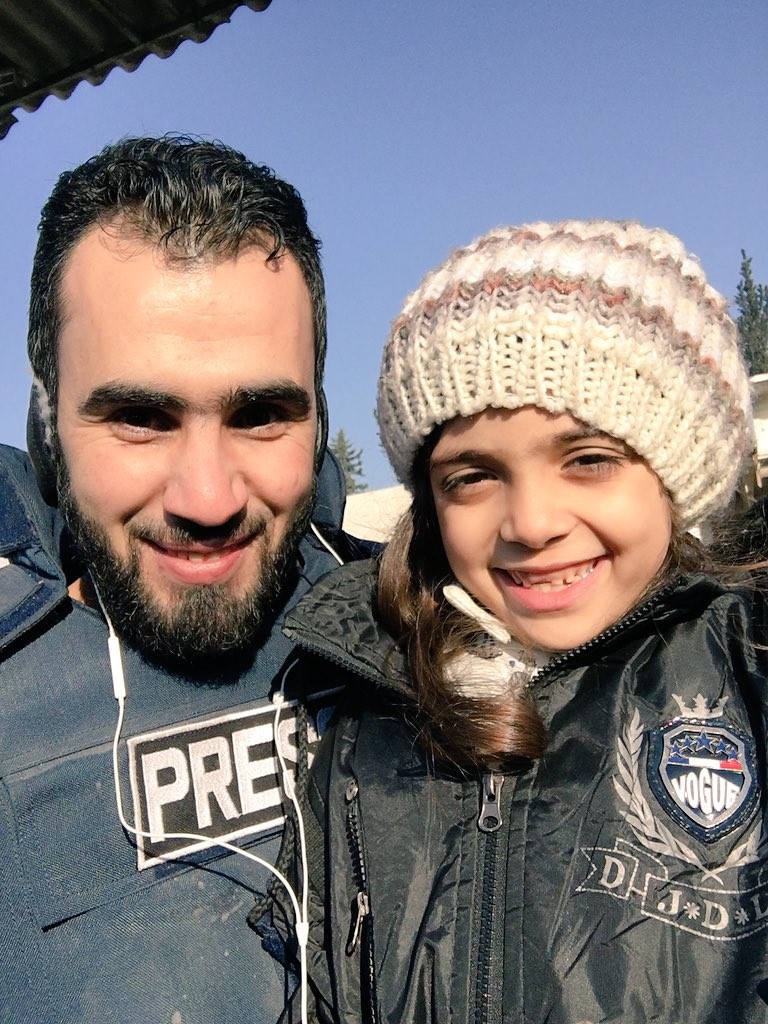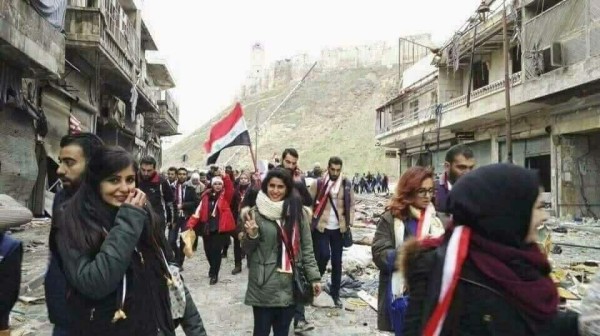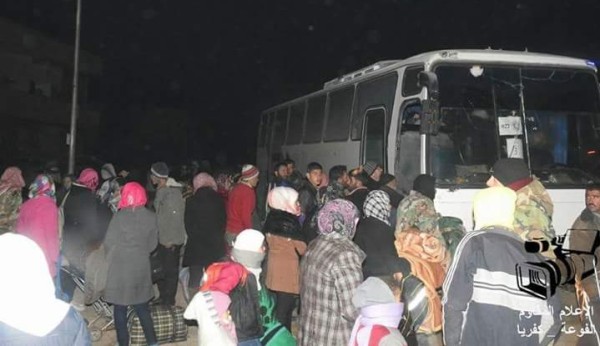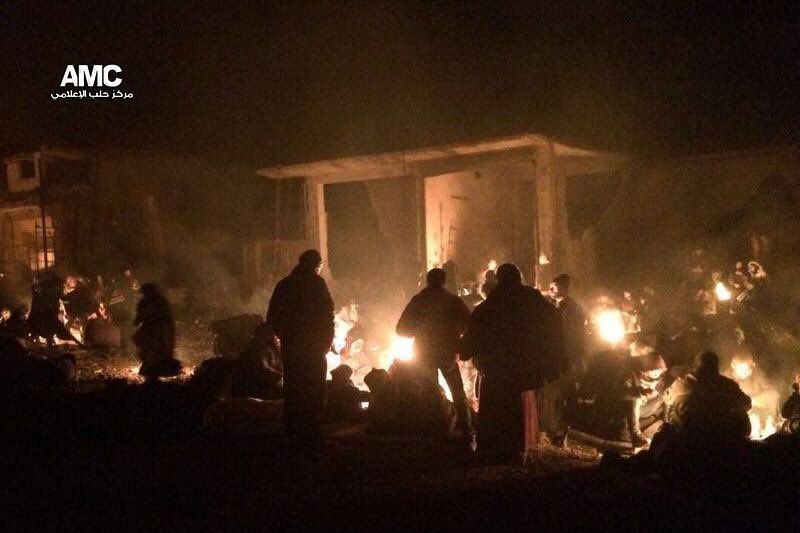PHOTO: Awaiting removal, people gather around a fire in eastern Aleppo city on Sunday
LATEST
UPDATE 1630 GMT: The Russian Ambassador to Turkey has been shot and killed while visiting a photo exhibition at an Ankara art gallery.
Now see Developing: Russian Ambassador to Turkey Assassinated in Ankara
UPDATE 1520 GMT: An interview with Bana al-Abed, the 7-year-old whose tweets and those of her mother brought international attention to the situation in eastern Aleppo city, after she was removed this morning to western Aleppo Province:
Our home was bombed. We came out from the rubble, thank God.
We suffered a lot because of the shelling.
And for those reading her messages:
I want to tell them that I am very thankful to them. And I am so thankful to all of Aleppo’s children.
UPDATE 1430 GMT: As expected, a UN Security Council resolution for international monitors in eastern Aleppo city and other areas of Syria has been adopted.
After Russia presented an alternative to the original French draft and removed its threat of veto, the resolution passed unanimously.
The measure requires all parties to “provide these monitors with safe, immediate and unimpeded access”, but it remains to be seen if the Assad regime will adhere (see earlier entry).
In a press conference after the vote, the regime’s UN ambassador, Bashar Ja’afari, criticized the vote, “While we respect the Security Council resolutions, we are aware of the real purpose of their efforts, which is to protect the terrorists…not the Syrian people.”
Those still waiting at the staging area for removals in east Aleppo:
UPDATE 1015 GMT: Abu Abd Ashidaa, the general commander of Aleppo’s rebels, has joined the criticism of Sunday’s attack on the convoy headed to the regime enclaves of al-Fu’ah and Kafraya in Idlib Province:
We were surprised by some unknown stupid people who burnt the empty busses.
Sticky to our agreements is obligatory. We will stay loyal to our agreements, and we are also to secure the safe exit of those leaving al-Fu’ah.
UPDATE 0805 GMT: Fatemah al-Abed and her 7-year-daughter Bana, whose first-hand accounts of life in eastern Aleppo city have drawn international attention to the Russian-regime siege and bombing, have been removed in a convoy this morning.
See Syria Analysis: Aleppo — Yes, 7-Year-Old Bana is Very Real
Bana with pro-opposition journalist Hadi al-Abdallah:

The rest of the Orphans has reached the West of #Aleppo safely ❤️
Now All of them safe and out of besieged Aleppo pic.twitter.com/8ZHnF9VYPI— Ahmad Alkhatib (@AhmadAlkhtiib) December 19, 2016
Arrival of the orphans in western Aleppo Province:
Video footage of our 41 orphans rescued from #Aleppo last night were transferred to their new warm shelters. pic.twitter.com/JLp3gWPjo4
— Humanitarian Relief (@IHHen) December 19, 2016
Zouhir al-Shimale describes the process, held up by Sunday’s suspension, of getting out of eastern Aleppo:
EXCLUSIVE: Aleppo resident and MEE contributor @ZouhirAlShimale speaks about being evacuated from besieged areas & has now arrived in Idlib pic.twitter.com/9owi0a08K6
— Middle East Eye (@MiddleEastEye) December 19, 2016
UPDATE 0745 GMT: Regime supporters walk through devastated eastern Aleppo city:

Meanwhile, journalist Bilal Abdul Kareem reports from the cold of the staging area for removals:
It's so cold that frost is on people's luggage trying to get out E. Aleppo. It's almost over but we need your eyes on us pic.twitter.com/YPf9SU9BYi
— Bilal Abdul Kareem (@BilalKareem) December 19, 2016
UPDATE 0725 GMT: A pro-opposition activist says another 46 buses are en route to eastern Aleppo city to remove more people.
Meanwhile, 10 buses have reached the regime enclaves of al-Fu’ah and Kafraya in Idlib Province, after yesterday’s initial convoy was attacked.
The convoy leaving the enclaves with passengers:
The first people leaving al-Fu’ah and Kafraya overnight:

ORIGINAL ENTRY: After another day of uncertainty and violence, removals of civilians and rebels from Syria’s largest city Aleppo resumed for a third time on Sunday.
Buses arrived in the late evening at the remaining opposition areas in eastern Aleppo city, where an estimated 50,000 people are enduring cold and the deprivation of a months-long Russian-regime siege.
By Monday morning, 21 buses had reached the western Aleppo countryside, en route to neighboring Idlib Province.
Arrival in middle of night of #Aleppo buses: cold & hunger.
Its what #UN could negociate to save innocent people.pic.twitter.com/R35WCCsGvI— Hope Sarout لمياء (@HopeSarout) December 18, 2016
A first-hand account from Rami Zien:
#standwithaleppo
After 11 hours inside the bus
And 40 hours waiting for bus
I made it out of #Aleppo
Thanks for your thoughts and prayers— Rami Zien (@Rami_Zien) December 18, 2016
My friend @Rami_Zien is free ✌🏻 just now pic.twitter.com/0yPIEmzWvV
— أَحمَد Primo (@PrimoAhmad) December 18, 2016
Orphanage director Ahmed al-Khatib:
Half of this beautiful orphans out of Aleppo and now in Safe place, The other part of them still in Besieged #Aleppo ❤️#standwithAleppo pic.twitter.com/fF9EZR3l2W
— Ahmad Alkhatib (@AhmadAlkhtiib) December 18, 2016
People still awaiting removal trying to stay warm in the staging area:
Attack on Buses for Regime Enclaves
However, the first removal of people from the regime enclaves of al-Fu’ah and Kafraya in opposition-held Idlib Province was blocked when a convoy en route to the villages was attacked and burnt.
Photographs and videos showed five burning or burned buses and the body of a driver, while the attackers celebrated.
Here are burnt busses of regime and #Iran. They were burnt to return honor of #Aleppo. Wake up Islamic Umma pic.twitter.com/ifiJZlTqyp
— EHSANI2 (@EHSANI22) 18 December 2016
Local sources said those responsible were members of Jund al-Aqsa — a former rebel faction now linked to the jihadists of Jabhat Fatah al-Sham — and men from the area.
Jund al-Aqsa has a concentration of fighters in Sarmin, southeast of Idlib city, near the site of the attack.
Under the third removals agreement within a week, 4,000 people of al-Fu’ah and Kafraya were added to those of eastern Aleppo city. The deal, brokered by Turkey and Russia, also covers about 1,500 wounded in the opposition-held towns of Zabadani and Madaya in Damascus Province.
Iran has undermined the first two agreements because of the exclusion of the regime enclaves. On Wednesday and Friday, the deals broke down because of shelling and gunfire by Iran-led and pro-Assad militias on a convoy and on the remaining opposition areas in Aleppo.
Rebels had opposed the inclusion of the regime enclaves because of fears that this would endanger Madaya and Zabadani: the two towns are currently linked to al-Fu’ah and Kafraya in an arrangement for some provision of aid and assurances against being overrun.
Russia supported the exclusion under the weekend, when the renewed negotiations — fostered by urgent calls between Turkish President Recep Tayyip Erdoğan and Russian counterpart Vladimir Putin — included both the Damascus towns and the regime enclaves.
UN Resolution for International Monitors Now Expected to Pass
A UN Security Council for international monitors in eastern Aleppo city is now expected to pass, after a shift in Russia’s position.
The Council agreed on Sunday on a compromise resolution and will formally vote on the text today.
Russia had said on Friday that it would veto a French draft, but on Sunday it circulated an alternative version that was welcomed by the French and other Council members.
Russian Ambassador Vitaly Churkin said: “I think we have a good text, we agreed to vote tomorrow morning.”
Russia, an essential backer of the Assad regime, has vetoed six Security Council resolutions on Syria since the conflict started in 2011. Two weeks, it objected to an initiative for a ceasefire in Aleppo, opening the way for further advances by pro-Assad forces.
“This would give us collectively the tools to avoid another Srebrenica,” said François Delattre, the French ambassador, referring to the mass killing of civilians in a besieged city in Bosnia more than 20 years ago.
However, it remains to be seen if the Assad regime will adhere to the resolution. The measure demands that all groups “provide these monitors with safe, immediate and unimpeded access”, but they can only begin operations after consultations with “interested parties”, including the Syrian military and militias.
Senior UN officials have repeatedly said that they have sought regime agreement to be present during the evacuation process, but have not received it.
The measure demands that the warring parties
Rebel Factions to Merge
Eight Syrian rebel factions, including the largest groups, are set to merge.
Spurred by defeat in Aleppo, the factions have been in discussions for weeks. On Sunday, a colonel in Jaish al-Mujahideen promised on Twitter that there would be a union within the “national project that represents the Syrian revolution”, vowing to fight till victory.
“Sources familiar with the deliberations” said Jaish al-Islam, Jaish al-Mujahideen, Faylaq al-Sham, Jaish al-Nasr, Fastaqim Union, and Suqour al-Sham have agreed terms. Talks are ongoing with Ahrar al-Sham and Nur al-Din al-Zenki.
The rebel factions are also considering a proposal by the jihadists of Jabhat Fatah al-Sham to merge at least 14 factions. JFS, formerly Jabhat al-Nusra, has set the condition that its head Abu Mohammad al-Joulani would be military commander and would be able to veto any choice of director of the political office, according to the sources.
They added that the JFS/Nusra conditions were rejected on Sunday.

